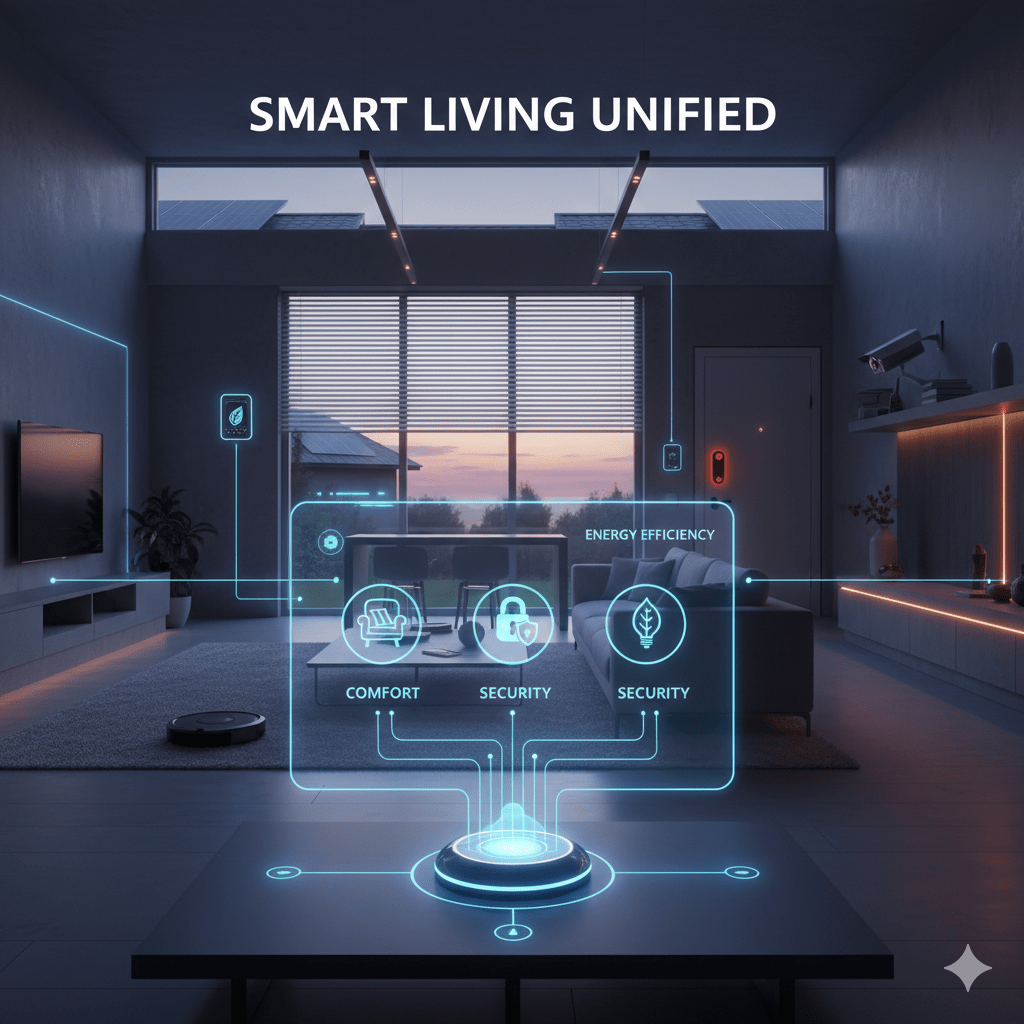How Smart Home Technology Will Change Lives
Smart home technology is reshaping the rhythm of daily living.
It cuts wasted effort, gives people more control over their surroundings, and saves time without asking them to change their routine.
Everyday life becomes smoother, more organized, and far more deliberate when the home responds to people instead of the other way around.
The Shift Toward Smarter Living
Homes are no longer silent spaces made of brick and cement.
They behave like personal assistants that can hear, observe, adjust, and respond based on habits.
A smart device is no longer a luxury piece of tech.
It is becoming part of how people manage life at home, the same way a light switch once became a normal part of living.
Smart home adoption is growing because convenience now matters as much as comfort.
People want homes that work for them while they focus on what deserves attention.
Tasks that used to eat minutes of every hour are now handled with a tap or voice prompt.
Why Smart Homes Are Becoming a Standard
People no longer see smart devices as toys.
They see them as tools that carry out household work in the background.
Lights change based on presence.
Rooms adjust their climate before someone even walks in.
Food reminders, energy use tracking, and scheduled tasks run with quiet accuracy.
This shift is not a trend.
It is a practical response to crowded schedules, longer work hours, and the need for ease inside the home.
Real-World Benefits of Smart Home Technology
Smart homes bring together comfort, time savings, and control.
Everything from lighting to temperature to safety can run without manual effort.
That single change reshapes household habits in ways most people never noticed until the convenience arrived.
People are not buying gadgets.
They are buying relief from tiny interruptions that stack up across the day.
Smart home technology also removes guesswork.
Devices give feedback that helps people manage cost, consumption, and risks.
Security cameras notify right away.
Thermostats prevent energy loss.
Digital locks track entries in real time.
Examples of Smart Home Technology in Daily Life
Smart speakers run routines.
Vacuum bots clean while nobody is looking.
Digital plugs shut off forgotten devices before they waste power.
Video doorbells handle visitor alerts before a knock even lands.
These are small pieces of automation that take over low-value chores.
- Digital fridges track items and cut food spoilage.
- Digital blinds open with the morning light and improve sleep rhythm.
- Digital ovens send alerts instead of forcing people to hover.
- Every feature leads to calmer living.
- Smart Homes and Personal Time
- Time is the real value here.
Most people do not notice how many minutes vanish on trivial house tasks until a device does it for them.
When the homework is in the background, attention becomes easier to manage.
This is not about being lazy.
It is about directing energy toward what matters.
Smart tech does the repetitive part, leaving people free to handle the human part.
Role of AI in Connected Homes
AI makes the system feel intuitive.
The home starts to learn patterns instead of waiting for constant instructions.
- Lights act before a person touches a switch.
- Climate systems anticipate usage instead of reacting late.
- This gives a steady feeling of ease.
- Nothing screams for attention.
- Things simply fall into place at the right moment.
(Insert infographic suggestion here: “How a Smart Home Learns Routine Over Time,” showing steps from input → pattern → automated response → refinement)
Energy Efficiency and Money Saving
One of the strongest reasons for adoption is energy savings.
Smart thermostats adjust consumption based on occupancy.
Smart plugs shut down sleepers and idle devices.
Smart lights dim or turn off automatically.
(Insert data section here: include a stat from a household energy survey showing how smart thermostats cut annual bills. Example placeholder: “Studies show a 10% to 23% drop in wasted electricity when automated climate control is in place.”
Lower consumption is not only good for bills.
It also stretches the lifespan of appliances by reducing strain.
Smart Home Safety and Security
Security is rising as the top reason people upgrade their homes.
Smart locks remove the risk of misplaced keys.
- Cameras offer direct visibility from anywhere in the world.
- Sensors detect leaks, fire hazards, or forced entry the second it begins.
- Security used to be about reacting after something went wrong.
- Connected technology gives advance warning while there is still time to act.
(Insert short video placement suggestion: A 10-15 second clip showing a doorbell camera sending a phone alert.)
Lifestyle Upgrades Through Subtle Changes
The power of connected technology does not come from big gestures.
It comes from the small corrections the home makes across the day.
- Better lighting equals a steadier mood.
- Fewer manual chores means a quieter mind.
- Cleaner routines result in smoother mornings.
- These benefits may look minor in isolation, but together, they reshape how a day feels.
The home becomes a comfort zone that supports living rather than demanding attention.
Smart Homes in 2025 and Beyond
The coming wave of smart homes will not focus only on devices.
It will focus on connection.
Different tools will speak to each other instead of working alone.
Lights, locks, sensors, speakers, blinds, air units, and plugs will run as one network.
People will not need to pick up a phone every time.
They will set behavior once, and the system will continue running based on pattern tracking.
This makes the home more personal without needing constant input.
How IoT Shapes Household Habits
IoT links each device to a shared system so information moves in real time.
That thread is what turns separate gadgets into a unified living setup.
- A smart vacuum knows when the house is empty.
- A smart speaker tells the thermostat someone just arrived.
- Doors, alarms, and lights act in coordination.
- Without that link, an intelligent home is just a collection of products.
With it, the home behaves like a single system that manages itself.
Smart Homes and Aging Convenience
Many people assume intelligent homes only matter for busy workers or tech fans.
They matter even more for elderly users.
- Voice control replaces complex instructions.
- Health monitoring becomes easier.
- Remote check-ins by family add peace of mind.
Smart living helps people stay comfortable in their own homes longer rather than relying on constant physical assistance.
Routine Becomes Effortless
Automation turns routine into something invisible.
Cooking reminders arrive on time.
Laundry cycles notify at completion.
Guests are logged before the door opens.
No one has to juggle a mental checklist while trying to rest.
The home becomes a support system, not a to-do list.
Final Word
Smart home technology is reshaping lifestyle habits around the world.
It saves time, trims costs, protects the home, and supports comfort without stealing attention.
People are choosing this path not for novelty, but for ease.
The home is finally working for the person, not the other way around.

